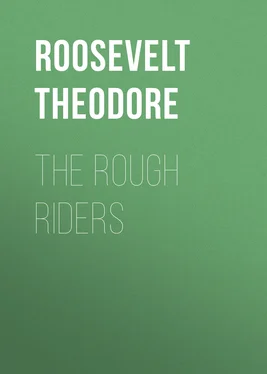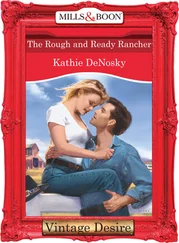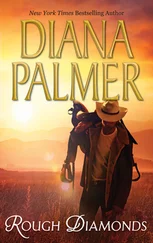Theodore Roosevelt - The Rough Riders
Здесь есть возможность читать онлайн «Theodore Roosevelt - The Rough Riders» — ознакомительный отрывок электронной книги совершенно бесплатно, а после прочтения отрывка купить полную версию. В некоторых случаях можно слушать аудио, скачать через торрент в формате fb2 и присутствует краткое содержание. Жанр: foreign_prose, История, foreign_edu, foreign_antique, на английском языке. Описание произведения, (предисловие) а так же отзывы посетителей доступны на портале библиотеки ЛибКат.
- Название:The Rough Riders
- Автор:
- Жанр:
- Год:неизвестен
- ISBN:нет данных
- Рейтинг книги:3 / 5. Голосов: 1
-
Избранное:Добавить в избранное
- Отзывы:
-
Ваша оценка:
- 60
- 1
- 2
- 3
- 4
- 5
The Rough Riders: краткое содержание, описание и аннотация
Предлагаем к чтению аннотацию, описание, краткое содержание или предисловие (зависит от того, что написал сам автор книги «The Rough Riders»). Если вы не нашли необходимую информацию о книге — напишите в комментариях, мы постараемся отыскать её.
The Rough Riders — читать онлайн ознакомительный отрывок
Ниже представлен текст книги, разбитый по страницам. Система сохранения места последней прочитанной страницы, позволяет с удобством читать онлайн бесплатно книгу «The Rough Riders», без необходимости каждый раз заново искать на чём Вы остановились. Поставьте закладку, и сможете в любой момент перейти на страницу, на которой закончили чтение.
Интервал:
Закладка:
It was on Sunday, May 29th, that we marched out of our hot, windy, dusty camp to take the cars for Tampa. Colonel Wood went first, with the three sections under his special care. I followed with the other four. The railway had promised us a forty-eight hours' trip, but our experience in loading was enough to show that the promise would not be made good. There were no proper facilities for getting the horses on or off the cars, or for feeding or watering them; and there was endless confusion and delay among the railway officials. I marched my four sections over in the afternoon, the first three having taken the entire day to get off. We occupied the night. As far as the regiment itself was concerned, we worked an excellent system, Wood instructing me exactly how to proceed so as to avoid confusion. Being a veteran campaigner, he had all along insisted that for such work as we had before us we must travel with the minimum possible luggage. The men had merely what they could carry on their own backs, and the officers very little more. My own roll of clothes and bedding could be put on my spare horse. The mule-train was to be used simply for food, forage, and spare ammunition. As it turned out, we were not allowed to take either it or the horses.
It was dusk when I marched my long files of dusty troopers into the station-yard. I then made all dismount, excepting the troop which I first intended to load. This was brought up to the first freight-car. Here every man unsaddled, and left his saddle, bridle, and all that he did not himself need in the car, each individual's property being corded together. A guard was left in the car, and the rest of the men took the naked horses into the pens to be fed and watered. The other troops were loaded in the same way in succession. With each section there were thus a couple of baggage-cars in which the horse-gear, the superfluous baggage, and the travel rations were carried; and I also put aboard, not only at starting, but at every other opportunity, what oats and hay I could get, so as to provide against accidents for the horses. By the time the baggage-cars were loaded the horses of the first section had eaten and drunk their fill, and we loaded them on cattle-cars. The officers of each troop saw to the loading, taking a dozen picked men to help them; for some of the wild creatures, half broken and fresh from the ranges, were with difficulty driven up the chutes. Meanwhile I superintended not merely my own men, but the railroad men; and when the delays of the latter, and their inability to understand what was necessary, grew past bearing, I took charge of the trains myself, so as to insure the horse-cars of each section being coupled with the baggage-cars of that section.
We worked until long past midnight before we got the horses and baggage aboard, and then found that for some reason the passenger-cars were delayed and would not be out for some hours. In the confusion and darkness men of the different troops had become scattered, and some had drifted off to the vile drinking-booths around the stock-yards; so I sent details to search the latter, while the trumpeters blew the assembly until the First Sergeants could account for all the men. Then the troops were arranged in order, and the men of each lay down where they were, by the tracks and in the brush, to sleep until morning.
At dawn the passenger-trains arrived. The senior Captain of each section saw to it that his own horses, troopers, and baggage were together; and one by one they started off, I taking the last in person. Captain Capron had at the very beginning shown himself to be simply invaluable, from his extraordinary energy, executive capacity, and mastery over men; and I kept his section next mine, so that we generally came together at the different yards.
The next four days were very hot and very dusty. I tried to arrange so the sections would be far enough apart to allow each ample time to unload, feed, water, and load the horses at any stopping-place before the next section could arrive. There was enough delay and failure to make connections on the part of the railroad people to keep me entirely busy, not to speak of seeing at the stopping-places that the inexperienced officers got enough hay for their horses, and that the water given to them was both ample in quantity and drinkable. It happened that we usually made our longest stops at night, and this meant that we were up all night long.
Two or three times a day I got the men buckets of hot coffee, and when we made a long enough stop they were allowed liberty under the supervision of the non-commissioned officers. Some of them abused the privilege, and started to get drunk. These were promptly handled with the necessary severity, in the interest of the others; for it was only by putting an immediate check to every form of lawlessness or disobedience among the few men who were inclined to be bad that we were enabled to give full liberty to those who would not abuse it.
Everywhere the people came out to greet us and cheer us. They brought us flowers; they brought us watermelons and other fruits, and sometimes jugs and pails of milk—all of which we greatly appreciated. We were travelling through a region where practically all the older men had served in the Confederate Army, and where the younger men had all their lives long drunk in the endless tales told by their elders, at home, and at the cross-roads taverns, and in the court-house squares, about the cavalry of Forrest and Morgan and the infantry of Jackson and Hood. The blood of the old men stirred to the distant breath of battle; the blood of the young men leaped hot with eager desire to accompany us. The older women, who remembered the dreadful misery of war—the misery that presses its iron weight most heavily on the wives and the little ones—looked sadly at us; but the young girls drove down in bevies, arrayed in their finery, to wave flags in farewell to the troopers and to beg cartridges and buttons as mementos. Everywhere we saw the Stars and Stripes, and everywhere we were told, half-laughing, by grizzled ex-Confederates that they had never dreamed in the bygone days of bitterness to greet the old flag as they now were greeting it, and to send their sons, as now they were sending them, to fight and die under it.
It was four days later that we disembarked, in a perfect welter of confusion. Tampa lay in the pine-covered sand-flats at the end of a one-track railroad, and everything connected with both military and railroad matters was in an almost inextricable tangle. There was no one to meet us or to tell us where we were to camp, and no one to issue us food for the first twenty-four hours; while the railroad people unloaded us wherever they pleased, or rather wherever the jam of all kinds of trains rendered it possible. We had to buy the men food out of our own pockets, and to seize wagons in order to get our spare baggage taken to the camping ground which we at last found had been allotted to us.
Once on the ground, we speedily got order out of confusion. Under Wood's eye the tents were put up in long streets, the picket-line of each troop stretching down its side of each street. The officers' quarters were at the upper ends of the streets, the company kitchens and sinks at the opposite ends. The camp was strictly policed, and drill promptly begun. For thirty-six hours we let the horses rest, drilling on foot, and then began the mounted drill again. The regiments with which we were afterward to serve were camped near us, and the sandy streets of the little town were thronged with soldiers, almost all of them regulars; for there were but one or two volunteer organizations besides ourselves. The regulars wore the canonical dark blue of Uncle Sam. Our own men were clad in dusty brown blouses, trousers and leggings being of the same hue, while the broad-brimmed soft hat was of dark gray; and very workmanlike they looked as, in column of fours, each troop trotted down its company street to form by squadron or battalion, the troopers sitting steadily in the saddles as they made their half-trained horses conform to the movement of the guidons.
Читать дальшеИнтервал:
Закладка:
Похожие книги на «The Rough Riders»
Представляем Вашему вниманию похожие книги на «The Rough Riders» списком для выбора. Мы отобрали схожую по названию и смыслу литературу в надежде предоставить читателям больше вариантов отыскать новые, интересные, ещё непрочитанные произведения.
Обсуждение, отзывы о книге «The Rough Riders» и просто собственные мнения читателей. Оставьте ваши комментарии, напишите, что Вы думаете о произведении, его смысле или главных героях. Укажите что конкретно понравилось, а что нет, и почему Вы так считаете.












